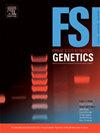The Missing Person problem through the lens of information theory
Abstract
Missing person cases typically require a genetic kinship test to determine the relationship between an unidentified individual and the relatives of the missing person. When not enough genetic evidence has been collected the lack of statistical power of these tests might lead to unreliable results. This is particularly true when just a few distant relatives are available for genotyping. In this contribution, we considered a Bayesian network approach for kinship testing and proposed several information theoretic metrics in order to quantitatively evaluate the information content of pedigrees. We show how these statistics are related to the widely used likelihood ratio values and could be employed to efficiently prioritize family members in order to optimize the statistical power in missing person problems. Our methodology seamlessly integrates with Bayesian modeling approaches, like the GENis platform that we have recently developed for high-throughput missing person identification tasks. Furthermore, our approach can also be easily incorporated into Elston-Stewart forensic frameworks. To facilitate the application of our methodology, we have developed the forensIT package, freely available on CRAN repository, which implements all the methodologies described in our manuscript.

 求助内容:
求助内容: 应助结果提醒方式:
应助结果提醒方式:


